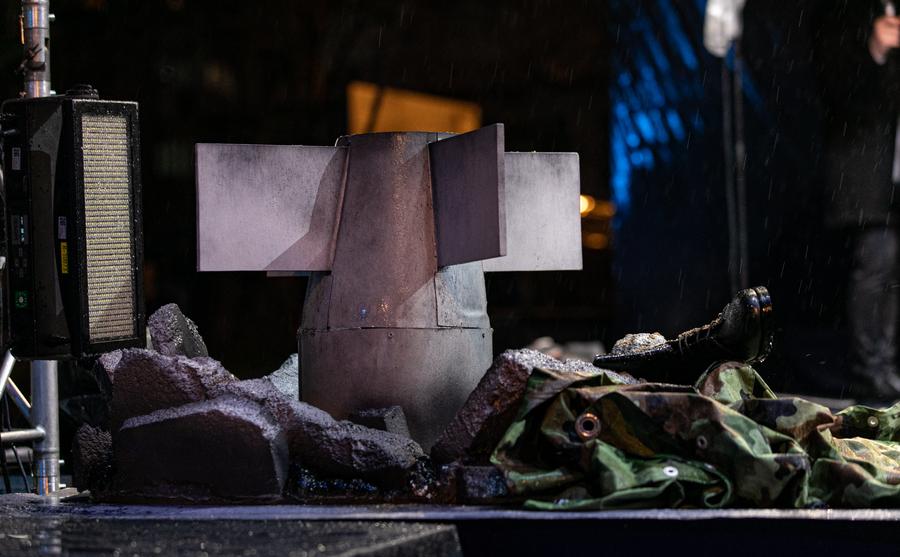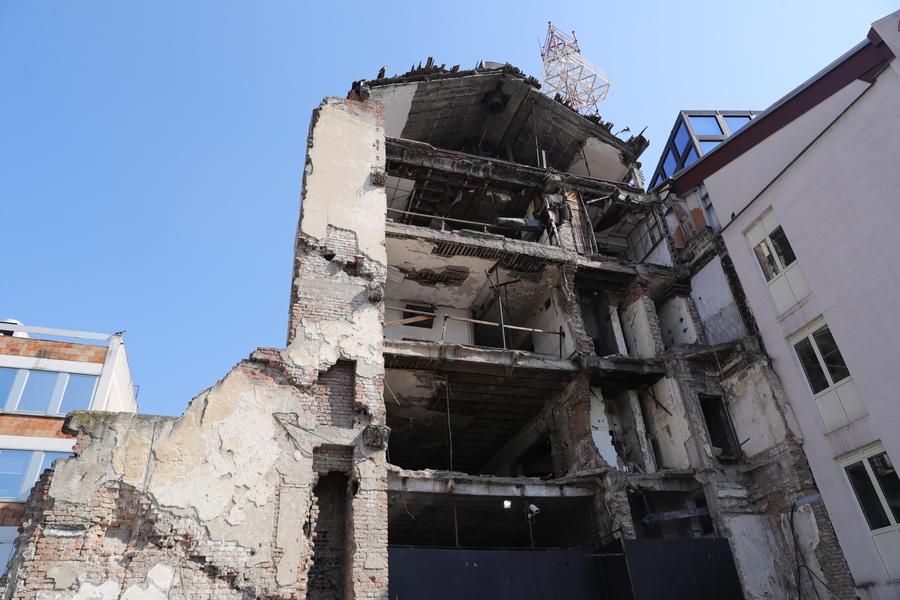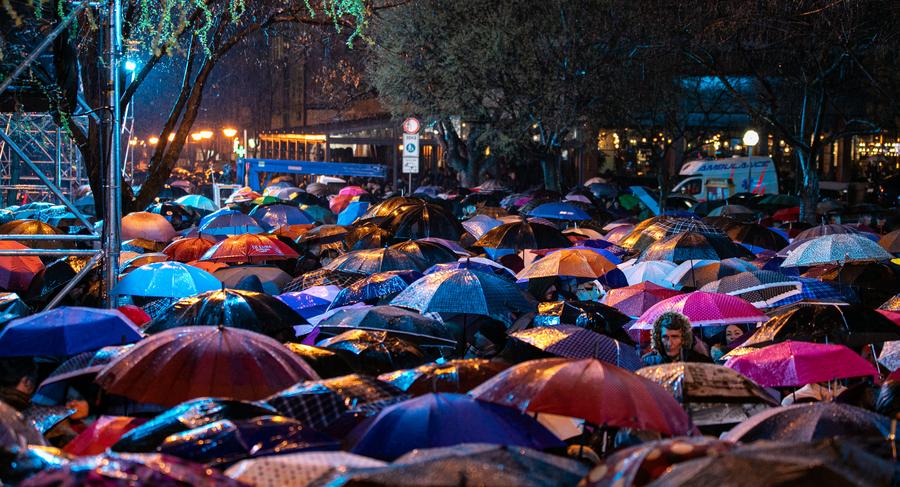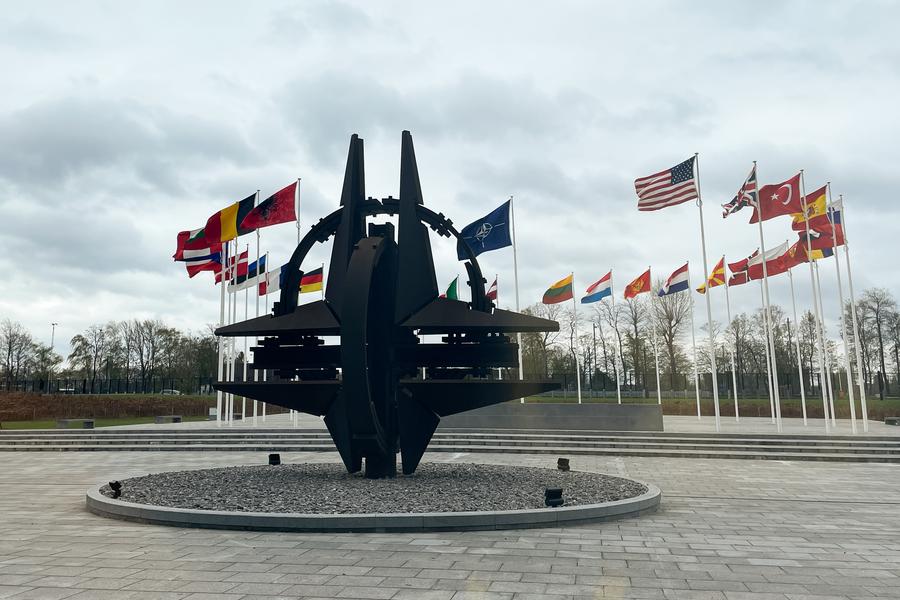
During the 78 days of relentless bombardments by NATO of then Federal Republic of Yugoslavia in 1999, thousands of lives of policemen, soldiers and civilians in Serbia were taken either directly by NATO's projectiles or indirectly by chaos and ethnic conflict, largely instigated by NATO.
BELGRADE, March 26 (Xinhua) -- Twenty-five years on, people in Serbia are still feeling the pain after NATO's bombing of then Federal Republic of Yugoslavia, while justice has yet to be done in the case of the aggression.
On March 24, 1999, NATO started an aerial bombing campaign against Yugoslavia without the authorization of the UN Security Council. During the 78-day bombings, Serbia lost thousands of policemen, soldiers, and civilians, and suffered immense damage to its transport and energy infrastructure.
Among NATO's targets were houses and apartment buildings, schools, hospitals, and even kindergartens, while the weapons deployed included missiles containing depleted uranium and cluster bombs.
Three Chinese reporters, including one from Xinhua, were killed during bombardments against the Chinese embassy in Belgrade.
Serbian people mark March 24 as Remembrance Day for the Victims of NATO Aggression by laying wreaths or framed photos of their loved ones whose lives have been taken either directly by NATO's projectiles or indirectly by chaos and ethnic conflict, largely instigated by NATO.
This year, the ceremony of the remembrance day was held at the main square of Prokuplje, a city some 250 km south of Belgrade, in the presence of President Aleksandar Vucic, government officials, policemen, soldiers, and thousands of civilians.
UNANSWERED QUESTIONS
Verica Tomanovic, president of the Association of Families of Kidnapped and Missing Persons in Kosovo and Metohija, recalled the arduous journey of hundreds of families. Representing 570 families who are still pining for their loved ones, her life journey over the past 25 years has been an unrelenting quest for truth and justice.
"Every passing day becomes heavier," said Tomanovic. In a poignant retelling of her personal tragedy, she shared the story of her husband Andrija, a dedicated doctor, and head of the surgical department in Pristina, whose life was abruptly halted by abduction.
"The assurances of NATO officials about safety and security crumbled as violence engulfed the region. People were targeted and killed on the streets based on ethnic affiliation," recalled Tomanovic, her voice filled with sorrow.

Despite promises of protection, her husband became a victim of the conflict, abducted in broad daylight while bystanders, including NATO soldiers, looked on.
"He was a man of deep empathy," she said, explaining how her husband stayed at his post out of dedication to his profession. The abduction of her husband, amidst the chaos following the NATO intervention, remains an open wound. With each passing year, the pain deepens.
Verica Tomanovic's relentless quest for truth has led her to the doors of international institutions, seeking answers that seem perpetually elusive. "We demand that the truth be uncovered," she said, clutching letters addressed to world leaders.
She mourns the absence of humanitarian rights in Kosovo and Metohija, where, despite tireless appeals to domestic and international bodies, answers remain beyond reach, "without exhumations, without identification, without accountability."
Standing amidst walls adorned with the faces of hundreds of kidnapped or missing individuals, including her husband Andrija, her determination remains unwavering after a quarter of a century.
"We have the right to know the truth," she said.
TOXIC LEGACY
With similar unwavering determination, Srdjan Aleksic, a lawyer from Nis, leads the charge in seeking redress for the victims of depleted uranium contamination, a legacy of warfare that has left a trail of devastation in its wake.
Born in Bustranje, a village nestled within the Presevo municipality, Aleksic's personal connection to the plight of his community runs deep. His mother, relatives, and neighbors succumbed to the ravages of cancer, a consequence of depleted uranium exposure during the 78 days of relentless bombardments.
For Aleksic, the pursuit of justice transcends legal advocacy; it is a deeply personal crusade. With over 4,000 individuals seeking solace and restitution through his legal counsel, Aleksic stands as a beacon of hope for those afflicted by the silent killer.
There were two analyses conducted in Turin, Italy, which confirmed that Colonel Dragan Stojcic of the Serbian Army and Ksenija Tadic have 500 times more depleted uranium in their bodies than in any other person, Aleksic said.

Colonel Dragan Stojcic, a respected member of the Serbian Army, tragically died from three types of cancer, underscoring the dire consequences of the toxic legacy.
Collaborating with legal counterparts in Italy, where landmark judgments have been handed down over the illness of Italian peacekeepers who spent time in Kosovo, Aleksic aims to replicate their success in Serbia.
"If we have in Italy 400 cases with final, confirmed judgments, where they managed to prove the causality, and this was confirmed by the Supreme Court of Italy -- why wouldn't we do the same in Serbia?" said Aleksic.
The use of depleted uranium is a war crime against civilians, said Aleksic. With its enduring half-life of 4.5 billion years, the toxic legacy of depleted uranium continues to cast a shadow over future generations.
CRIPPLED INT'L LAW
"It's evident that on that fateful day, justice was undermined, and fairness was compromised," said Milos Vucevic, Serbian deputy prime minister and minister of defense, during the international conference "From Aggression to New Just Order" held in Belgrade on the occasion of the 25th anniversary of the bombing.
"From the onset of terrorist attacks and NATO aggression to the present day, we've witnessed numerous humanitarian catastrophes stemming from the pursuit of power and the delusion of one's supremacy, a delusion that disregards eternal truths, namely, that justice will inevitably prevail," he said.

Speaking at the conference, Nikola Selakovic, minister in charge of veteran affairs, condemned NATO intervention in 1999 "a crime against the then Federal Republic of Yugoslavia."
"The balance sheet of this entire period is marked by hundreds of killed, missing, hundreds of thousands of exiles and displaced persons, dozens of destroyed and burned churches and monasteries, crimes without punishment," said Selakovic.
Everything raises the question of whether the aggression that began on March 24, 1999, really ended on June 10 of that year or is still ongoing, he added.













